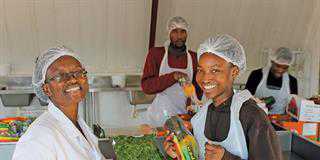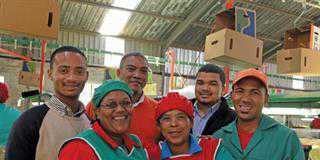
Photo: Supplied
Please tell us more about Agbiz’s mission and vision, and why an organisation such as yours is important to South Africa’s agriculture sector.
Agbiz’s mission is to negotiate and facilitate a favourable environment for businesses in South Africa’s agricultural value chains, so that they can operate competitively and sustainably.
We’re a non-profit, membership-based organisation that acts as a link between agribusinesses and important stakeholders such as government, social partners and other regulators. We also have desks that cater for the specific needs of the grain storage and handling value chain, and the fruit and wine value chain.
Essentially, our role is twofold: to lobby for a business environment that enables agribusinesses, and to act as a thought leader and a trusted source of information on the sector.
What, in your opinion, are the biggest opportunities for the agribusiness sector in 2022 and the role that Agbiz can play in this regard?
Apart from the recent severe flood damage suffered in certain areas, the conditions for agriculture in South Africa are generally quite good for the second year in a row, and this is reflected in the optimism prevailing in the sector.
In the fourth quarter of 2021, the Agbiz/ IDC confidence index reached 74 points, its second-highest level since inception in 2001. The index is not based on sentiment alone; it includes metrics such as employment, capital investment, export volumes and the provision for bad debt by agricultural financiers.
The implication is that agribusinesses are investing and placing their faith in the economic opportunities provided by the local sector, be it for export or the local market.
And what are the challenges facing the sector?
I can keep you busy on this topic all day! This may be a bit of a loaded question, as Agbiz’s entire raison d’être is based on finding innovative ways to resolve the cross-cutting challenges faced by the sector.
Agriculture is in a fortunate position in the economy:
the sector is growing and businesses are investing. Nevertheless, serious interventions will be required to ensure that this growth is both sustainable and inclusive.
To use the citrus industry as an example, the Bureau for Food and Agricultural Policy estimates that our citrus production could increase by as much as 50% by 2030, taking into consideration the number of trees that have been planted but are yet to yield fruit. Most of this is destined for the export market, but we’ll need to negotiate more favourable trade terms with several export markets if we want to remain competitive against countries in South America and Australasia, for example.
A related challenge is the state of our logistical infrastructure. Increased production and formal access to markets will be of little value if we’re unable to send products to markets.
This is a challenge that affects almost every value chain.
Our port container facilities struggle to keep up with demand during peak export
seasons. We need to invest in modern infrastructure as a country and ensure that productivity is up to international standards. Likewise, border posts such as Beitbridge (South Africa–Zimbabwe) and Lebombo (South Africa–Mozambique) seriously hamper intra-African trade. Modernising these ports of entry will be essential to achieving a common trade area on the continent.
Finally, South Africa’s provincial and municipal roads are not being maintained
to an acceptable level in several areas. The rural road network is the lifeblood of the agriculture sector. Revitalisation of the rail network is also an option, but cable theft must be dealt with for rail to become a viable option.
These factors, coupled with the adaptation of new technology, capacity in key regulatory positions, and climate change adaptation are critical to sustaining the sector’s strong performance.
In what way does the work of Agbiz benefit primary agricultural producers?
We often work on policy and regulatory issues that affect the primary sector directly, but our focus is to unlock the blockages in the value chains that create demand and value for the primary producer.
The term ‘value chain’ is highly appropriate, as you cannot push a chain; you can only pull it. In this sense, growth in primary production is ‘pulled’ from demand down the value chain. If we can improve the ease of doing business for companies in the value chain, it will have a knock-on effect for primary producers.
That being said, Agbiz also plays a vital role in supporting the upstream value chain to facilitate a business environment where primary producers can have access to world-class inputs.
How does Agbiz plan to engage with the state in 2022, and what are the most pressing issues on the table at the moment?
We have a multi-pronged strategy that makes use of formal engagement structures as well as direct communication. Agbiz forms part of Business Unity South Africa, the apex body for business in South Africa, through which we work together with organisations representing other sectors on common issues.
By working with other organisations, we also have access to the National Economic Development and Labour Council, where business, labour, government and the community come together to address the key issues affecting the economy. Perhaps the most important part of our business is to build relationships of trust.
Government increasingly made positive noises about public-private partnerships (PPPs) in 2021. What is your take on this and why are such partnerships needed?
The only way in which we can overcome the numerous challenges facing our country is if the public and private sectors work together. The private sector offers a wealth of skills and has the capacity to implement projects, but there are limits to what individual companies can achieve.
At the same time, government has the resources and the developmental mandate to nurture inclusive growth. And a PPP can be more than the sum of its parts. However, a partnership will only work when based on trust, and it’s for this reason that we work so hard to build bridges between industry and government.
What are the opportunities for PPPs, and which partnerships should be prioritised in 2022?
This conversation has been taking place for a long time, but my wish is that 2022 will be the year where we finally move towards implementation. For the past two years, agribusinesses and financiers have been working with government on a blended finance model that combines grant funding with commercial finance to deliver subsidised finance to black emerging farmers. Hopefully, this can be rolled out at scale in 2022.
The Agriculture and Agro-processing Master Plan is another critical social compact in the sector, and its success will depend on all social partners’ involvement. Agbiz has been an active participant in the process over the past few years to ensure that we build a competitive and inclusive food, fibre and beverages sector.
A number of issues are still under discussion, but broadly speaking, this is a necessary process. If implemented fully and carefully, with the participation of all key social partners, it could turn out to be positive for the sector, the economy, and our country.
We’re also experiencing bottlenecks where the sector is hampered by long delays in the registration of new input products and where inspections or product approvals need to take place.
In general, PPPs have the potential to build capacity and improve productivity. The efficiency of ports could also be improved through PPPs.
How important is a well-functioning, sustainable and profitable agricultural value chain for the national economy?
I might be biased, but to my mind its importance cannot be overstated. During the past two years, our economy has depended largely on growth in the mining and agricultural value chains. Mining is largely at the mercy of international commodity price fluctuations, but agriculture is the one sector that continued to increase the volume of its outputs despite the global pandemic.
Apart from the jobs and revenue that it creates, a robust local sector helps to buffer South Africa against high food prices, as it can produce most products at export parity prices. If our sector were not profitable and internationally competitive, we would have to import food products at import parity prices.
As it stands, food in South Africa is amongst the most affordable in the world; our biggest constraint to food security is that many South Africans simply don’t have an income. If we had to rely primarily on imports, our food security situation would be far more dire.
What is the best-case scenario for the local agribusiness sector in 10 years?
In the best-case scenario, the constraints outlined above would be unlocked and this would enable the sector to sustain its current growth. This growth also needs to be inclusive, so the best-case scenario would see new entrants being brought into the formal value chain through joint ventures, PPPs, and effective enablers that promote transformation.
And the worst-case scenario?
This is not really an avenue any of us would like to conceptualise, but agriculture cannot operate in isolation from the broader socio-economic challenges faced by the country.
If we don’t create jobs, fix our infrastructure and provide a stable and secure environment that promotes investment, the sector will invariably stagnate. We all have to work very hard to make sure this doesn’t happen in our lifetimes.
Email Theo Boshoff at [email protected].











